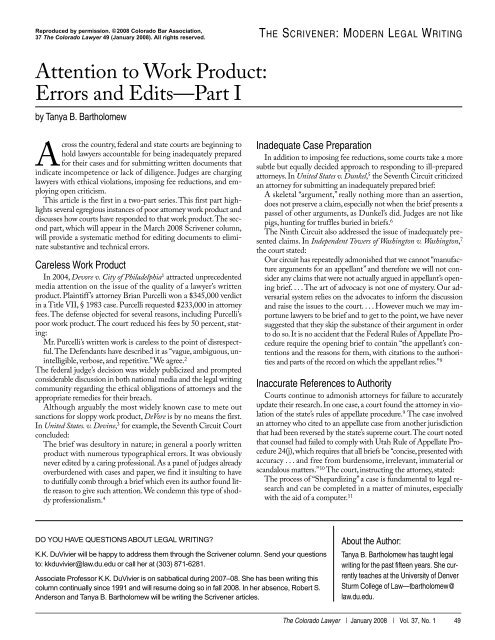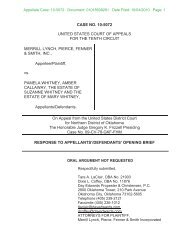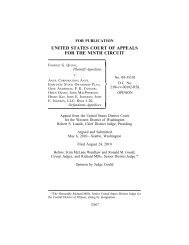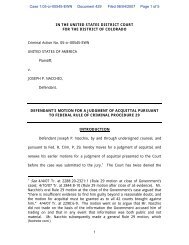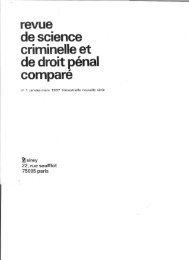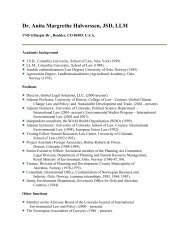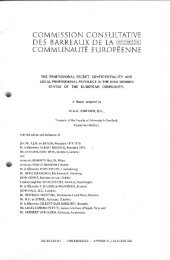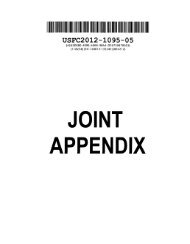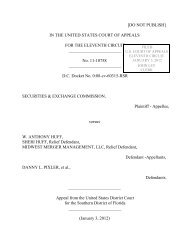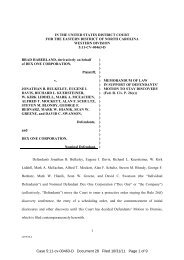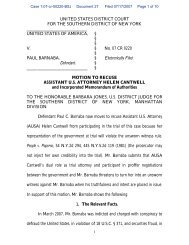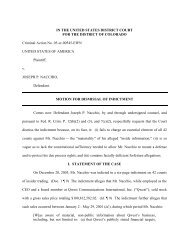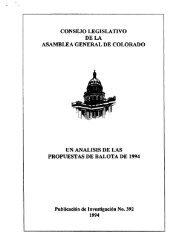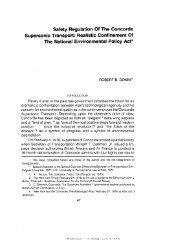Attention to Work Product: Errors and Edits—Part I - Sturm College of ...
Attention to Work Product: Errors and Edits—Part I - Sturm College of ...
Attention to Work Product: Errors and Edits—Part I - Sturm College of ...
Create successful ePaper yourself
Turn your PDF publications into a flip-book with our unique Google optimized e-Paper software.
Reproduced by permission. ©2008 Colorado Bar Association,<br />
37 The Colorado Lawyer 49 (January 2008). All rights reserved.<br />
<strong>Attention</strong> <strong>to</strong> <strong>Work</strong> <strong>Product</strong>:<br />
<strong>Errors</strong> <strong>and</strong> <strong>Edits—Part</strong> I<br />
by Tanya B. Bartholomew<br />
Across the country, federal <strong>and</strong> state courts are beginning <strong>to</strong><br />
hold lawyers accountable for being inadequately prepared<br />
for their cases <strong>and</strong> for submitting written documents that<br />
indicate incompetence or lack <strong>of</strong> diligence. Judges are charging<br />
lawyers with ethical violations, imposing fee reductions, <strong>and</strong> employing<br />
open criticism.<br />
This article is the first in a two-part series. This first part highlights<br />
several egregious instances <strong>of</strong> poor at<strong>to</strong>rney work product <strong>and</strong><br />
discusses how courts have responded <strong>to</strong> that work product.The second<br />
part, which will appear in the March 2008 Scrivener column,<br />
will provide a systematic method for editing documents <strong>to</strong> eliminate<br />
substantive <strong>and</strong> technical errors.<br />
Careless <strong>Work</strong> <strong>Product</strong><br />
In 2004, Devore v. City <strong>of</strong> Philadelphia 1 attracted unprecedented<br />
media attention on the issue <strong>of</strong> the quality <strong>of</strong> a lawyer’s written<br />
product. Plaintiff ’s at<strong>to</strong>rney Brian Purcelli won a $345,000 verdict<br />
in a Title VII, § 1983 case. Purcelli requested $233,000 in at<strong>to</strong>rney<br />
fees. The defense objected for several reasons, including Purcelli’s<br />
poor work product. The court reduced his fees by 50 percent, stating:<br />
Mr. Purcelli’s written work is careless <strong>to</strong> the point <strong>of</strong> disrespectful.The<br />
Defendants have described it as “vague, ambiguous, unintelligible,<br />
verbose, <strong>and</strong> repetitive.’’We agree. 2<br />
The federal judge’s decision was widely publicized <strong>and</strong> prompted<br />
considerable discussion in both national media <strong>and</strong> the legal writing<br />
community regarding the ethical obligations <strong>of</strong> at<strong>to</strong>rneys <strong>and</strong> the<br />
appropriate remedies for their breach.<br />
Although arguably the most widely known case <strong>to</strong> mete out<br />
sanctions for sloppy work product, DeVore is by no means the first.<br />
In United States. v. Devine, 3 for example, the Seventh Circuit Court<br />
concluded:<br />
The brief was desul<strong>to</strong>ry in nature; in general a poorly written<br />
product with numerous typographical errors. It was obviously<br />
never edited by a caring pr<strong>of</strong>essional. As a panel <strong>of</strong> judges already<br />
overburdened with cases <strong>and</strong> paper, we find it insulting <strong>to</strong> have<br />
<strong>to</strong> dutifully comb through a brief which even its author found little<br />
reason <strong>to</strong> give such attention.We condemn this type <strong>of</strong> shoddy<br />
pr<strong>of</strong>essionalism. 4<br />
DO YOU HAVE QUESTIONS ABOUT LEGAL WRITING?<br />
K.K. DuVivier will be happy <strong>to</strong> address them through the Scrivener column. Send your questions<br />
<strong>to</strong>: kkduvivier@law.du.edu or call her at (303) 871-6281.<br />
Associate Pr<strong>of</strong>essor K.K. DuVivier is on sabbatical during 2007–08. She has been writing this<br />
column continually since 1991 <strong>and</strong> will resume doing so in fall 2008. In her absence, Robert S.<br />
Anderson <strong>and</strong> Tanya B. Bartholomew will be writing the Scrivener articles.<br />
THE SCRIVENER: MODERN LEGAL WRITING<br />
Inadequate Case Preparation<br />
In addition <strong>to</strong> imposing fee reductions, some courts take a more<br />
subtle but equally decided approach <strong>to</strong> responding <strong>to</strong> ill-prepared<br />
at<strong>to</strong>rneys. In United States v. Dunkel, 5 the Seventh Circuit criticized<br />
an at<strong>to</strong>rney for submitting an inadequately prepared brief:<br />
A skeletal “argument,’’ really nothing more than an assertion,<br />
does not preserve a claim, especially not when the brief presents a<br />
passel <strong>of</strong> other arguments, as Dunkel’s did. Judges are not like<br />
pigs, hunting for truffles buried in briefs. 6<br />
The Ninth Circuit also addressed the issue <strong>of</strong> inadequately presented<br />
claims. In Independent Towers <strong>of</strong> Washing<strong>to</strong>n v. Washing<strong>to</strong>n, 7<br />
the court stated:<br />
Our circuit has repeatedly admonished that we cannot “manufacture<br />
arguments for an appellant” <strong>and</strong> therefore we will not consider<br />
any claims that were not actually argued in appellant’s opening<br />
brief....The art <strong>of</strong> advocacy is not one <strong>of</strong> mystery. Our adversarial<br />
system relies on the advocates <strong>to</strong> inform the discussion<br />
<strong>and</strong> raise the issues <strong>to</strong> the court. ...However much we may importune<br />
lawyers <strong>to</strong> be brief <strong>and</strong> <strong>to</strong> get <strong>to</strong> the point, we have never<br />
suggested that they skip the substance <strong>of</strong> their argument in order<br />
<strong>to</strong> do so. It is no accident that the Federal Rules <strong>of</strong> Appellate Procedure<br />
require the opening brief <strong>to</strong> contain “the appellant’s contentions<br />
<strong>and</strong> the reasons for them, with citations <strong>to</strong> the authorities<br />
<strong>and</strong> parts <strong>of</strong> the record on which the appellant relies.” 8<br />
Inaccurate References <strong>to</strong> Authority<br />
Courts continue <strong>to</strong> admonish at<strong>to</strong>rneys for failure <strong>to</strong> accurately<br />
update their research. In one case, a court found the at<strong>to</strong>rney in violation<br />
<strong>of</strong> the state’s rules <strong>of</strong> appellate procedure. 9 The case involved<br />
an at<strong>to</strong>rney who cited <strong>to</strong> an appellate case from another jurisdiction<br />
that had been reversed by the state’s supreme court.The court noted<br />
that counsel had failed <strong>to</strong> comply with Utah Rule <strong>of</strong> Appellate Procedure<br />
24(j), which requires that all briefs be “concise, presented with<br />
accuracy . . . <strong>and</strong> free from burdensome, irrelevant, immaterial or<br />
sc<strong>and</strong>alous matters.” 10 The court, instructing the at<strong>to</strong>rney, stated:<br />
The process <strong>of</strong> “Shepardizing” a case is fundamental <strong>to</strong> legal research<br />
<strong>and</strong> can be completed in a matter <strong>of</strong> minutes, especially<br />
with the aid <strong>of</strong> a computer. 11<br />
About the Author:<br />
Tanya B. Bartholomew has taught legal<br />
writing for the past fifteen years. She currently<br />
teaches at the University <strong>of</strong> Denver<br />
<strong>Sturm</strong> <strong>College</strong> <strong>of</strong> Law—tbartholomew@<br />
law.du.edu.<br />
The Colorado Lawyer | January 2008 | Vol. 37, No. 1 49
The federal courts are equally as direct in admonishing at<strong>to</strong>rneys<br />
who fail <strong>to</strong> update their research:<br />
It is really inexcusable for any lawyer <strong>to</strong> fail, as a matter <strong>of</strong> routine,<br />
<strong>to</strong> Shepardize all cited cases. ...Shepardization would <strong>of</strong><br />
course reveal that the “precedent”no longer qualified as such. 12<br />
Experienced at<strong>to</strong>rneys are not immune <strong>to</strong> careless mistakes, <strong>and</strong><br />
some courts have been willing <strong>to</strong> call attention <strong>to</strong> an at<strong>to</strong>rneys’experience<br />
in their admonitions. For example, in DeMyrick v. Guest<br />
Quarters Suite Hotels, 13 the court noted:<br />
DeMyrick’s motion is particularly distressing under the circumstances.<br />
It is not simply that DeMyrick’s counsel are highly experienced<br />
in Illinois personal injury practice <strong>and</strong> might therefore<br />
be expected <strong>to</strong> keep themselves current on such issues that<br />
are <strong>of</strong> importance <strong>of</strong> the conduct <strong>of</strong> such practice <strong>and</strong> that arise<br />
with some frequency. Beyond that expectancy, no counsel ought<br />
<strong>to</strong> cite a case . . . without Shepardizing that case (or without conducting<br />
the equivalent electronic search via Westlaw or Lexis). 14<br />
Conclusion<br />
Many <strong>of</strong> the at<strong>to</strong>rneys involved in these cases were not new <strong>to</strong><br />
the practice <strong>of</strong> law <strong>and</strong>, for the most part, the bulk <strong>of</strong> their work<br />
product could not be characterized by carelessness or inattention. 15<br />
However, it is very easy for the at<strong>to</strong>rney work product <strong>to</strong> suffer<br />
when at<strong>to</strong>rneys are pressed for time.<br />
50 The Colorado Lawyer | January 2008 | Vol. 37, No. 1<br />
THE SCRIVENER: MODERN LEGAL WRITING<br />
<br />
In the second part <strong>of</strong> this article, I will discuss a systematic<br />
method <strong>of</strong> editing that will help protect practicing at<strong>to</strong>rneys from<br />
many <strong>of</strong> the pitfalls described here. Using a checklist <strong>and</strong> a specific<br />
outline as a guide, at<strong>to</strong>rneys can eliminate the types <strong>of</strong> errors that<br />
plagued the documents addressed in this article.<br />
Notes<br />
1. Devore v. City <strong>of</strong> Philadelphia, No. 00-3598, 2004 WL 414085 (E.D.<br />
Pa. Feb. 20, 2004).<br />
2. Id. at *2.<br />
3. United States v. Devine, 787 F.2d 1086 (7th Cir. 1986).<br />
4. Id. at 1089.<br />
5. United States v. Dunkel, 927 F.2d 955 (7th Cir. 1991) (per curiam).<br />
6. Id. at 956.<br />
7. Independent Towers <strong>of</strong> Washing<strong>to</strong>n v. Washing<strong>to</strong>n, 350 F.3d 925 (9th<br />
Cir. 2003).<br />
8. Id. at 929-30.<br />
9. Meadowbrook, LLC v. Flower, 959 P.2d 115 (Utah 1998).<br />
10. Id. at 120 n.11.<br />
11. Id.<br />
12. Gosnell v. Ren<strong>to</strong>kil, Inc., 175 F.R.D. 508, 510 n.1 (N.D.Ill. 1997).<br />
13. DeMyrick v. Guest Quarters Suite Hotels, No. 93C1520, 1997 WL<br />
177838 (N.D.Ill. April 6, 1997).<br />
14. Id.<br />
15. See, e.g., id. ■


